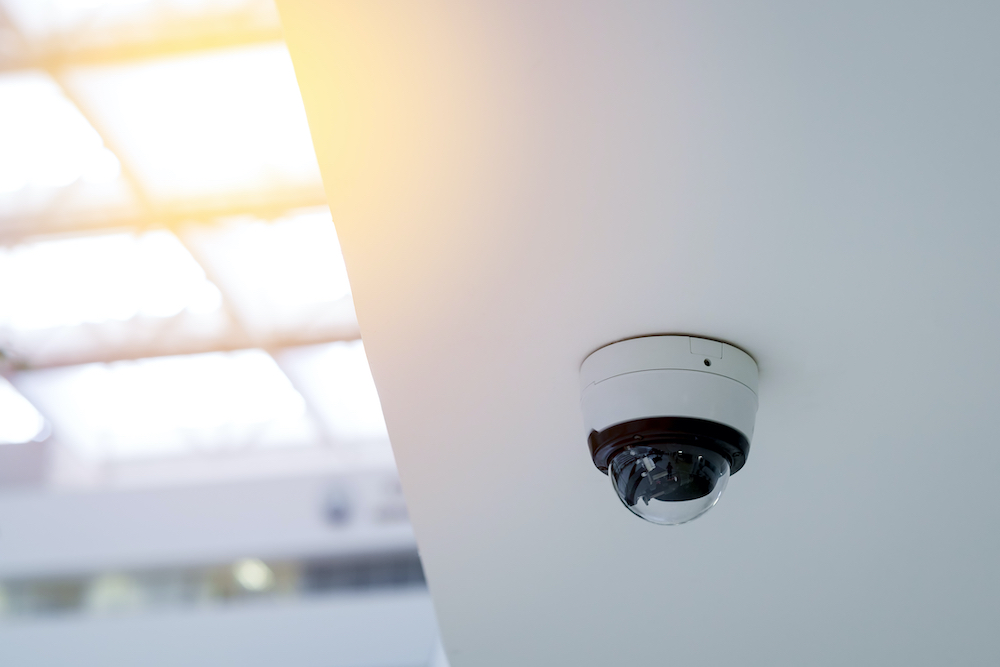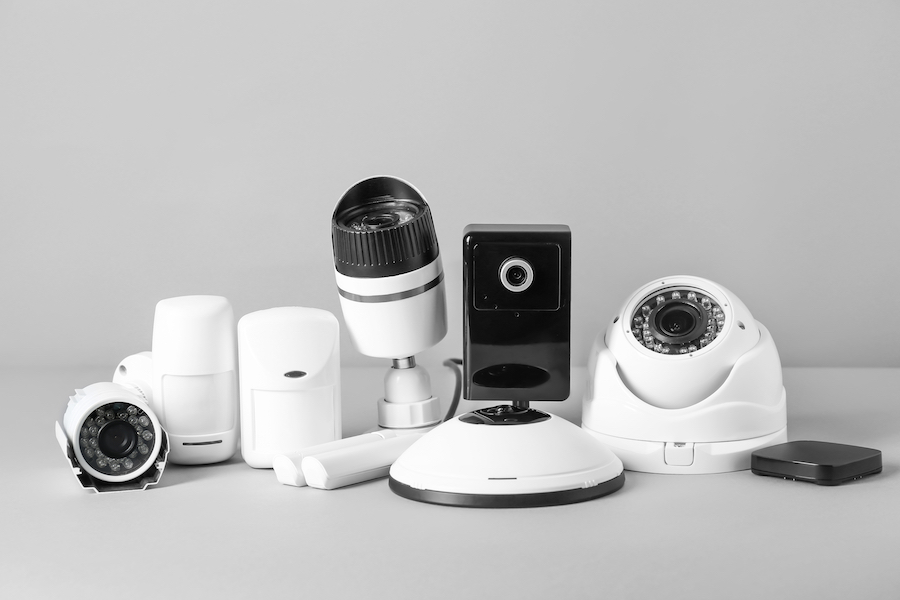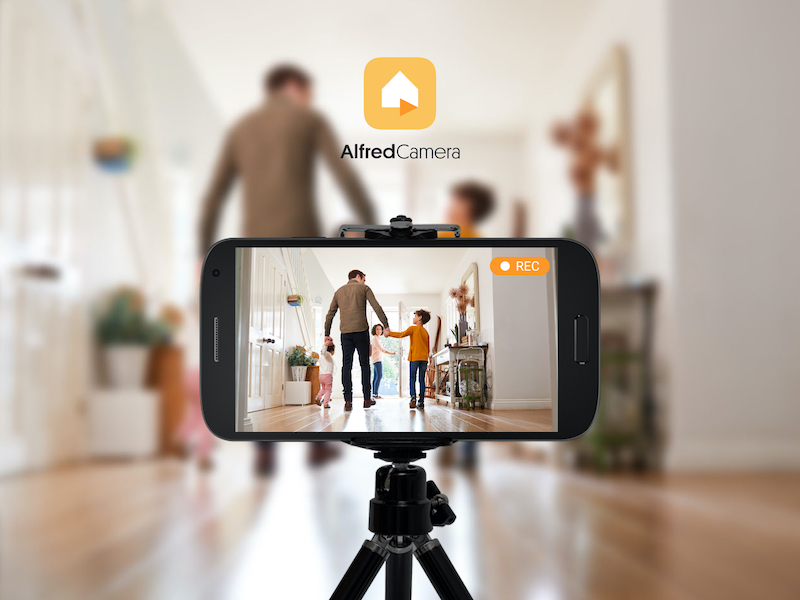We’ll be the first to admit that there’s a confusing number of terms thrown about to describe very similar products and services in the security sphere.
Though these are often nothing more than synonyms, sometimes there are differences—as is the case when describing security cameras and security systems.
Much like alarm systems, it helps to understand what makes security cameras and security systems different so that you can make the right choice when purchasing security products for your space.
Learn more about what you need below.
What are Security Cameras?
All security cameras have one thing in common: they observe and record video footage. Nowadays, the differences from model-to-model are quite varied. In public spaces, you might find traditional analog CCTV, whereas a home is more suited to smaller, Wi-Fi-enabled devices.
Many IP cameras now incorporate advanced features, like motion detection and facial recognition. This adds certain advantages, like making it more useful for security purposes and reducing the amount of footage needed to be saved.

With an ever-increasing palette of features to choose from, security cameras can be used for different purposes. From our own experience, the AlfredCamera team has noticed that baby monitoring, pet monitoring, and even bird watching are all great ways that users are making use of their security camera aside from regular observation.
What are Security Systems?
A ‘security system’ refers to a packaged product combining multiple security products and services. While a quick search for ‘security cameras’ will result in standalone products, security systems are much more robust and varied, making them most useful for business, office, and larger homes.
Recommended reading: Security Cameras for Business, Big and Small
Though companies selling security systems will have a variety of sometimes customizable package deals available depending on your specific needs, you can generally expect multiple security cameras, alarms, keypads, motion detectors, apps, and installation and maintenance services to be included.

As one might imagine, this can be expensive upfront and is usually obtained on a quote-by-quote basis. This is followed by monthly or annual fees for monitoring services. But there’s no denying that it is far more convenient for businesses (and even homeowners) who need an all-inclusive deal to cover all their bases.
In the event that something requires fixing, a professional can handle it, letting you go about your life hassle-free.
Security Cameras vs Security Systems: Which Do I Need?
There’s no simple answer when it comes to figuring out whether security cameras or security systems are better for your needs, but there are some key things to consider that’ll help you gain a better understanding of those needs.
1. Affordability
Financial circumstances shouldn’t define whether you have access to security or not, but, unfortunately, it will define which types of products you have access to.
Thankfully, security cameras are now much more affordable, with options for inexpensive home security cameras filling the pages of Amazon. Expect the most affordable options for non-name brand standalone cameras to start at just below $40.
Security systems will cost significantly more, which is hardly surprising since you will end up with a variety of products and services. For smaller businesses and homes, building your own ‘system’ through multiple IP cameras and alarms will be less expensive.
The upfront cost of a security system usually doesn’t fall any lower than $200 for the most basic options.
2. Scale of Property
The scale of the property being surveyed is a significant factor in determining the number of products you need, and how feature-rich they are.
Context helps here: a fine jeweler will need to take significantly more security measures than the owner of a small apartment.
Larger homes and businesses will also need more security cameras to ensure there are no blind spots and more alarms to cover the greater number of doors and windows around the property.
An inclusive security system will come with multiple cameras and alarms, meaning you won’t have to shop around for larger properties.
3. Cost to Run
Aside from the upfront cost, both standalone security cameras and security systems tend to come with monthly or annual fees to effectively ‘run’ the products.
Many leading IP camera brands will require a subscription for cloud storage, as well as access to more advanced features hidden behind paywalls, like facial recognition. However, this isn’t a given. Here is a list of security cameras that don’t require subscription.
On the other hand, security systems provided by industry leaders like ADT will always come with additional fees, since they will include professional installation, maintenance, and 24/7 coverage.
These fees can vary considerably, so you’ll need to obtain a quote based on your requirements.
4. Ease of Installation
With our commitments to work, family, and—hopefully—leisure, many of us simply don’t have the time for a lengthy installation process. But busy lives should never be a barrier to feeling safe and secure.
Standalone IP cameras are generally a breeze to set up, especially those that incorporate smart home features and can be integrated into existing products around the space. Find out security cameras that work with Google Home or Amazon Alexa.
Security systems can take several days to set up, since it’s a more complicated job that may involve hardwiring and multiple different products. Thankfully, it probably won’t be you doing all the work, as professional installation is usually part of the deal.
5. Existing Knowledge
Setting up one’s own de facto security system, though much more inexpensive and, presumably, well-suited to one’s own needs, can require a fair amount of knowledge about security products and how to set them up.
Sure, a quick browse on the AlfredCamera blog will leave you with a fabulous working knowledge of all things security, but security systems will require virtually no existing knowledge at all other than what the professional installing the system tells you.
Where to Buy Security Cameras and Security Systems
With so many security cameras and security system package deals available, knowing the best places to find security products can help you get the best quality at the best prices. Here’s our picks for convenient, affordable security shopping.
Amazon – sometimes the most obvious choice is the best. Regular deals on home tech makes security cameras affordable, and you’ll even find some security systems at enviable prices. Naturally, these won’t be nearly as robust as ones you’ll find from ADT, nor will they come with professional installation–but for casual uses, Amazon has a broad range of security goods that are easy to access.
BestBuy – evolving beyond the audio-only focus of yesteryear, BestBuy boasts a massive range of great security products, including cameras and systems, for affordable prices. With regular deals, outlet clearances, and the option for ‘Totaltech’ tech support, BestBuy is a great place to search for security tech. Totaltech gives you access to 24/7 tech support, product protection and warranties, free shipping, and more, but at $199.99 a year, we can only really recommend it for businesses and tech fanatics.
Walmart – rival chain Walmart also has a fantastic range of security products at reasonable prices, as well as super-fast shipping and pick up options. You’ll find leading brand security cameras as well as affordable security systems that combine multiple cameras and NVR/DVR channels, so that you can have eyes and ears everywhere around your property.
ADT – for security systems fit for a king, ADT is unrivaled. Founded back in 1874, ADT provides a range of different security-related products, including fire protection and alarm services. Packages are made with you in mind, combining cameras, alarms, and more, allowing you to put your trust in a knowing professional—they’ll handle everything. You’ll have to get a quote to figure out exactly how much all this will cost, and you can expect semi-regular fees for maintenance and upkeep.
AlfredCamera – for the budget-conscious, AlfredCamera’s got your back. Enjoy superior advanced features like two-way audio, motion detection, and continuous recording, without the hassle of a lengthy installation. The simple setup allows you to get back to your life immediately, and AlfredCamera seamlessly slips into your routine without changing it thanks to push notifications.

AlfredCamera is available to download for Android and iOS devices.
Conclusion
A DIY approach to security systems is very much possible; though it may end up requiring more effort and research on your part, you can seamlessly combine smart products like cameras and alarms to create effective security capable of protecting your space. Do it wisely and, undoubtedly, you’ll save yourself some cash in the process.
However, for businesses and larger homes, an all-inclusive security system may be more beneficial, since it will cover all your bases and include maintenance and support. This will come at a cost but is essential for larger businesses or shops selling high-priced valuables.
Recommended reading: Apartment Security 101: DIY, Deadbolts, & Smart Devices
